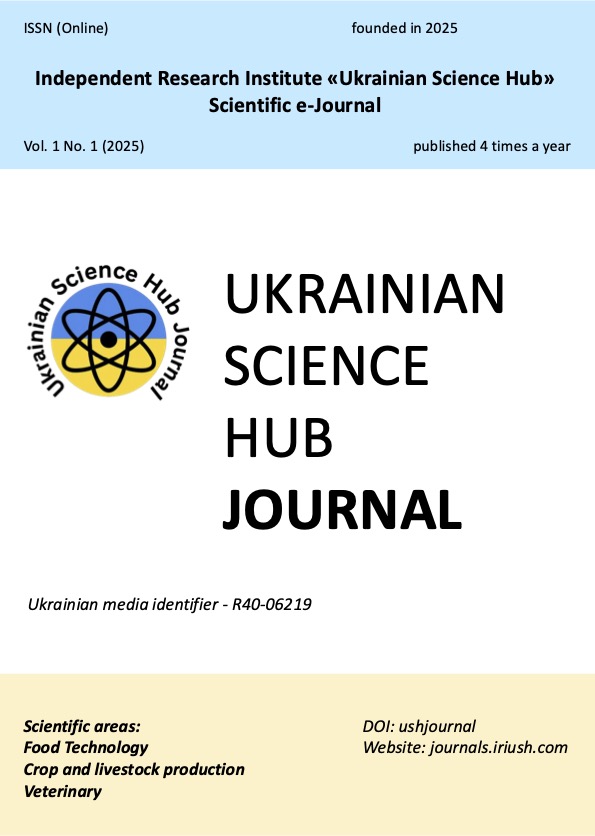ISO 9001 – ORIENTED QUALITY MANAGEMENT SYSTEM FOR MEAT SNACK MANUFACTURING
DOI:
https://doi.org/10.64378/iriush.journals.2025.1.4Keywords:
Quality Management System, ISO 9001:2015, Meat Processing Industry, Competitiveness, Continuous Improvement, Consumer TrustAbstract
The article examines the specific features of implementing a quality management system in accordance with the requirements of DSTU ISO 9001:2015 in the operations of a young meat processing enterprise specializing in the production of high-protein snacks. The relevance of applying international standards in the food industry is substantiated, considering the need to harmonize national practices with global market requirements and to strengthen consumer trust. An analysis of the enterprise’s quality management system revealed several problematic aspects, including the absence of a quality policy, insufficient process formalization, lack of systematic risk monitoring, and no practice of internal audits. Based on this analysis, proposals were developed for the integration of quality management system elements, including a quality policy, a process interaction scheme, and an internal audit procedure. The proposed approaches are aimed at strengthening production task discipline, increasing process transparency, and fostering a culture of continuous improvement. The expected results of implementing these measures include reduced production costs, stronger competitive positions, enhanced corporate image, and the creation of prerequisites for entering international markets. It is concluded that systematic implementation of ISO 9001 in the meat processing sector should be considered not only as a means of confirming product quality but also as a strategic tool for improving operational efficiency, oriented toward sustainable development and long-term market resilience.
References
Bondarenko, S. (2022). The "lean six sigma" system as a tool for improving the quality of business processes and sustainable development of the enterprise. Investytsiyi: praktyka ta dosvid, No 17/2022. https://doi.org/10.32702/2306-6814.2022.17.62.
Drahnieva, N., Dobrivska, M. (2023). Current Tendencies in the Forming of Quality Management Systems. Ukrainian Journal of Applied Economics and Technology. Volume 8. № 4, рр. 244 – 249. https://doi.org/10.36887/2415-8453-2023-4-40.
Fonseca, L. M., & Domingues, J. P. (2018). Empirical research of the ISO 9001:2015 transition process in Portugal: Motivations, benefits, and success factors. Quality Innovation Prosperity, 22*(2), 16–39. https://doi.org/10.12776/QIP.V22I2.1099.
International Organization for Standardization. (2015). ISO 14001:2015 Environmental management systems – Requirements with guidance for use. ISO.
International Organization for Standardization. (2015). ISO 9001:2015 Quality management systems – Requirements. ISO.
International Organization for Standardization. (2018a). ISO 22000:2018 Food safety management systems – Requirements for any organization in the food chain*. ISO.
International Organization for Standardization. (2018b). ISO 45001:2018 Occupational health and safety management systems – Requirements with guidance for use. ISO.
Kalicheva, N. E., Kutsenko, N. M., Godunov, F. A. (2023). Product quality management of the food industry. The bulletin of transport and industry economics, 84. https://doi.org/10.18664/btie.84.301467.
Kapaj, I., & Kapaj, A. M. (2021). Quantifying factors that influence the implementation of quality management systems in meat processing industry: case of Albania. European Journal of Research and Reflection in Management Sciences Vol, 9(1).
Kiryushkov, V. O. (2023). Integrated quality management systems of food industry. Retrieved from https://dspace.znu.edu.ua/jspui/handle/12345/8984.
Lingur, L., Martyniuk, O., & Yesina, O. (2023). Implementation of quality standards in the management of small and medium business enterprises. Scientific Bulletin of Poltava University of Economics and Trade. A Series of “Economic Sciences”, (1 (107), 12-18. https://doi.org/10.37734/2409-6873-2023-1-2.
Muminović, F., Keran, H., Bajramović, E., Hadžihasanović, M., & Hadžić, M. (2023). Benefits of introduction and implementation of ISO 14001 standard in the meat industry. In Book of Proceedings. Retrieved from https://www.researchgate.net/profile/Alma-Micijevic/publication/389844947_THE_INFLUENCE_OF_TYPE_OF_SOIL_
ON_THE_LEVEL_OF_MINERAL_SUBSTANCES/links/67d3fc777c5b5569dcbb931d/THE-INFLUENCE-OF-TYPE-OF-SOIL-ON-THE-LEVEL-OF-MINERAL-SUBSTANCES.pdf#page=313.
Nordenskjöld, J. (2012). Implementation of a quality management system in food production. Retrieved from https://stud.epsilon.slu.se/4676/7/nordenskjold_j_120815.pdf.
Polkovnychenko, S. (2023). Quality Management System as an Important Component of Enterprise Strategy. Efektyvna ekonomika. http://doi.org/10.32702/2307-2105.2023.11.38.
Radovanović, R., & Tomašević, I. (2011). Food safety and quality management system performances in Serbian meat industry. Scientific Journal "Meat Technology", 52(1), 1-12. Retrieved from http://www.journalmeattechnology.com/index.php/meat_technology/article/view/250.
Radovanović, R., Đekić, I., Tomašević, I., Tomić, N., Šmigić, N., Rajković, A., & Zarić, V. (2013). Effects of food safety and quality management systems in the serbian meat industry. In International 57 th Meat Industry Conference, Belgrade (pp. 75-83).
Sampaio, P., Saraiva, P., & Guimarães Rodrigues, A. (2011). The economic impact of quality management systems in Portuguese certified companies. International Journal of Quality & Reliability Management, 28 (9): 929–950. https://doi.org/10.1108/02656711111172522.
Schröder, J. A., Morven, G. McEachern. (2002). ISO 9001 as an audit frame for integrated quality management in meat supply chains: the example of Scottish beef. Managerial Auditing Journal 1 February, 17 (1-2): 79–85. https://doi.org/10.1108/02686900210412289.
Strashynska, L., & Sheremet, O. (2021). Improvement of the regulatory legal basis of meat processing enterprises as a factor of product quality management. Retrieved from https://dspace.nuft.edu.ua/handle/123456789/34615.
Terletska, Y., & Kravchuk, A. (2022). Product Quality Management in the Enterprise Competitiveness System. Young Scientist, 1 (101), 242-245. https://doi.org/10.32839/2304-5809/2022-1-101-49.
Tomašević, I., Šmigić, N., Đekić, I., Zarić, V., Tomić, N., Miocinovic, J., & Rajković, A. (2016). Evaluation of food safety management systems in Serbian dairy industry. Dairy/Mljekarstvo, 66(1). https://doi.org/10.15567/mljekarstvo.2016.0105.
Walaszczyk, A. (2024). Impact of quality management system on responsible food production. Scientific Papers of Silesian University of Technology. Organization & Management/Zeszyty Naukowe Politechniki Slaskiej. Seria Organizacji i Zarzadzanie, (207).
Downloads
Published
Issue
Section
License

This work is licensed under a Creative Commons Attribution-NonCommercial-ShareAlike 4.0 International License.


